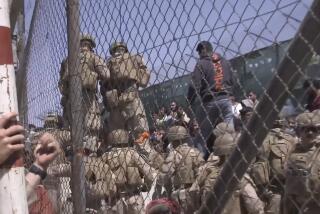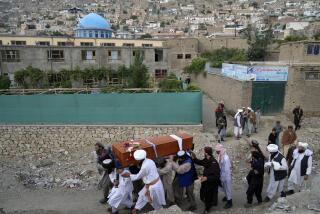Afghan president offers to meet Taliban leader
- Share via
KABUL, AFGHANISTAN — President Hamid Karzai, expressing horror at a suicide bombing here in the capital that killed at least 30 people, offered Saturday to meet with Taliban leader Mullah Mohammed Omar to stop the carnage.
Karzai spoke at an emotional news conference hours after an early morning blast tore through a bus carrying soldiers to their posts.
The explosion was so powerful it ripped the roof and sides from the bus, scattering body parts and debris along a street in the city center.
Most of the dead were thought to be soldiers, but at least two were civilians who were near the bus when it blew up. Dozens of people were wounded.
A purported Taliban spokesman calling himself Zabibullah Mujahed claimed responsibility for the attack in text messages sent to Western news agencies.
Several times in recent weeks, Karzai has suggested direct talks with the Taliban, the austere Islamic militia driven from power by a U.S.-led invasion nearly six years ago.
But Saturday’s appeal, aimed directly at fugitive Taliban leader Omar and warlord Gulbuddin Hekmatyar, carried more urgency than the U.S.-backed president’s previous overtures.
“If I find their address, there is no need for them to come to me -- I’ll personally go there and get in touch with them,” Karzai told reporters at his presidential palace.
Apparently paraphrasing the question he would put to them, he asked: “ ‘Esteemed mullah, sir, and esteemed Hekmatyar, sir, why are you destroying the country?’ ”
U.S. diplomats and military officials in Afghanistan would not comment directly on Karzai’s appeal, although one American official, speaking on condition of anonymity, cautioned against taking too literally Karzai’s offer to personally meet the insurgent leaders.
Taliban fighters have responded to the president’s previous overtures by demanding that all foreign forces leave Afghanistan before any talks take place.
The North Atlantic Treaty Organization, in turn, has said it would consider negotiations only with fighters who were willing to lay down their arms.
In intensified fighting in the last 18 months, the insurgents have made little headway against a vastly superior U.S.- and NATO-led force but have extracted a heavy toll in civilian lives and rendered large swaths of the country unsafe.
The bus bombing was the worst in Kabul since a similar blast in June, also targeting a bus carrying security personnel, killed about 35 people.
As in Iraq, attacks are commonly carried out in Afghanistan during the Muslim holy month of Ramadan, but Karzai said the timing rendered the attack particularly heinous.
“It was a terrible tragedy, no doubt an act of extreme cowardice,” Karzai told reporters. “Whoever did this was against people, against humanity, definitely against Islam. A man who calls himself Muslim will not blow up innocent people in the middle of Ramadan.”
The bombing left searchers clambering onto rooftops and even into treetops to retrieve victims’ remains. Survivors told police that the bomber had been wearing a military uniform.
A shopkeeper named Mujeeb Rahman was about to open his store near where the bus had stopped to pick up soldiers when he heard an enormous explosion. Turning, he at first could see only a cloud of dust and smoke.
“And then I saw the bus with no roof on it,” he said. “And human bodies everywhere in the street.”
Meanwhile, the International Committee of the Red Cross said four of its employees kidnapped last week had been freed unharmed.
Franz Rauchenstein, deputy head of the organization’s delegation in Kabul, called the release of the two foreigners and two Afghans “a great relief” and said no ransom had been paid for them and no other concessions were made.
Abductions of aid workers and other foreigners have become more common in the last year.
Twenty-three South Korean church workers were kidnapped in July, and 21 of them were released after protracted negotiations. Two of the hostages were killed.
--
Special correspondent Faiez reported from Kabul and Times staff writer King from Islamabad, Pakistan.
More to Read
Sign up for Essential California
The most important California stories and recommendations in your inbox every morning.
You may occasionally receive promotional content from the Los Angeles Times.












